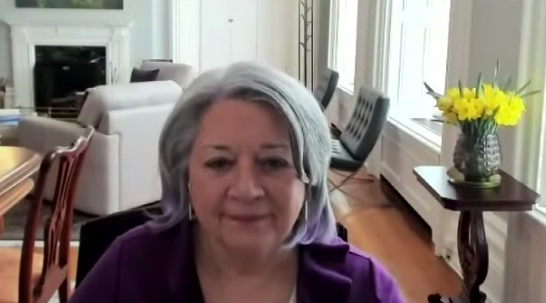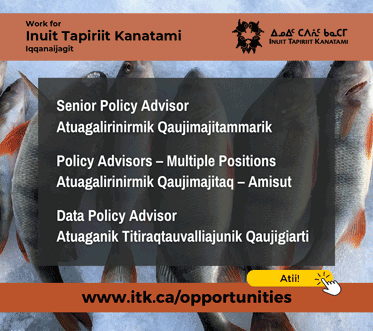‘Reconciliation is not a project’: Mary Simon shares wisdom at Queen’s University
Governor General gives virtual talk as part of Distinguished Speaker series
Governor General Mary Simon speaks Tuesday as part of the Distinguished Speaker series, hosted by the school of policy studies at Queen’s University. (Screen shot courtesy of the Cable Public Affairs Channel/YouTube)
Gov. Gen. Mary Simon recalls that growing up in Nunavik as the child of an Inuk mother and non-Inuk father was an experience of “walking between worlds” that has helped her connect with Canadians, and connect Canadians with each other.
“During my life, I would … [use] my knowledge of one to benefit the other, always with the goal of improving Inuit life,” said Simon, giving her perspective as part of a virtual conversation called “Through the Eyes of the North: Our Collective Responsibility” at Queen’s University Tuesday.
Her talk was part of the Distinguished Speaker series, hosted by the university’s school of policy studies.
Speaking in English and French, Simon spoke of milestones and the role of reconciliation moving forward. Noting Pope Francis’ recent apology for the abuse experienced by survivors of the residential school system, she said such words “must be followed with action.”
“Reconciliation is not a project, nor does it have an end date,” Simon said. “We must always strive to acknowledge the pain and the truth of our history.”
She also stressed the importance of policymaking in furthering reconciliation, pointing to systemic issues in the North such as food insecurity, lower education levels, incomes and life expectancy, and high suicide rates.
“For too long, policies were imposed by asking, ‘What do we think is best for Inuit people? For Indigenous peoples?’” Simon said.
“We need to rephrase that question: ‘What do Inuit people believe is the best course for themselves?’ One question takes agency away. The other gives it back.”
Bob Watts, former interim executive director of Canada’s Truth and Reconciliation Commission and adjunct professor at Queen’s, also took the time to ask Simon about her thoughts on climate change.
In response, Simon spoke of the role Indigenous knowledge plays in giving climate and environment scientists more than one knowledge base to work from.
“Part of the solution [to climate change] is to not always just acknowledge Indigenous knowledge in documents and reports, but to actually work with people that are working in those [communities],” she said.
Established by Tom Courchene, the inaugural director of the school of policy studies at Queen’s, the Distinguished Speaker series aims to engage faculty, students, policymakers, politicians and other opinion leaders in discussions on major policy issues.
Past speakers include former justice minister and attorney general Jody Wilson-Raybould, former Truth and Reconciliation Commission chair Murray Sinclair, and Natan Obed, president of Inuit Tapariit Kanatami, the national organization representing Inuit in Canada.






My first thought when Simon says “Indigenous knowledge… [gives] climate and environment scientists more than one knowledge base to work from” is to find a good metaphor to capture how nebulous a claim like this sounds when left to stand alone as it does here.
Perhaps that cool, languid cloud that rises and drops from an oil diffuser? Have you noticed the lovely smell?
A general weakness of journalism in the north (in my opinion) is the unwillingness to probe more deeply into points like this. Perhaps because asking seems disrespectful? Of course, ‘not asking’ sends a signal of trust, deference, and respect.
But this tepid, fearful approach does not serve any of us, least of all the next generation of Inuit who will be told that traditional knowledge occupies a deserved place astride western epistemology, without ever being given the tools to relay to the world what that means, or the certainty to know for themselves.
iThink, you’re projecting the conventional (capitalist) approach to government policy development. There are, I’m sure, other examples like Ducks Unlimited and Greenpeace that are giving ‘indigenous’ knowledge a chance.
Thanks for your response, Jay.
I don’t know what to say to your point that I am projecting a “capitalist approach to policy development.” I really don’t see that, but am curious to know what I’ve said to make you think so?
My point isn’t that Indigenous Knowledge shouldn’t be given a chance or has no value, rather that it is so often invoked as a sacrament, inviolable… yet remains ill defined, especially in contrast to western knowledge, which it is often compared to.
It is one thing to say that Indigenous and Western knowledge both represent bodies of accumulated knowledge about the world (this is undoubtedly true). The more interesting question is the method by which that knowledge was accumulated.
How do you know, for example, what you say you know?
If that can’t be answered then it seems to have some philosophical problems.
Now, I’m not saying it can’t, only that this burden rarely seems to be recognized. The rare exception being when it is said to be ‘holisitic’—hinting at a quasi-spiritual approach.
What do you think?
Interesting back and forth here, I think Jay stereotypes you and didn’t really think your first comment over much at all.
Just so you know, Jay. I wrote a response to your comment on the thread about the Tuniit. For some reason Nunatsiaq has decided not to allow that up, and for discernibly no good reason. Sad, isn’t it, to see one of the few good conversations that appear here censored by journalists for whatever personal little quips they have?
Science is not be all and end all.
One way of knowledge is different from where you grow up and what environment shapes it.
Not all animals can climb a tree. It doesn’t mean one is inferior than the other. It’s monkeys and elephants. Two different views.
Inuit knowledge is the same.
This comment doesn’t make sense to me.
It’s not about superior vs inferior, at all. It’s about the casual use of an idea, either as a bludgeon or to confer moral authority at convenience with no obligation to outline what one means by the concept itself.
How do people get away with it?
Besides the people who don’t care, the ones who do are too afraid of being accused of racism or insensitivity to even ask these questions (accusations like this are also bludgeons people use to avoid seriously engaging with difficult questions they know they don’t understand or can’t answer either).
Inuit knowledge, indigenous knowledge, like fishing knowledge, hunting and gathering knowledge. All through history, scientific knowledge always used these oral traditions of Inuit and other oral cultural, these none written societies to spice up the thoroughness of science. It’s the same with societies that have been accused of over hunted , overfished the resources, even their own resources in their own backyards. Scientific probing was always there to gather knowledge of why depletion was or has happened, but only to the applying their conclusions based on what the locals have told them. Of to themselves the scientific community often Failed terribly. They would never be capable of providing the reality of whether the stocks were depleted or not, without the traditional knowledge. And may I add, declaring a resource gone and depleted has often been the wrong call. Scientists have not done any better of a job in management of the resources than Inuit or other traditionalist. The problem with Inuit knowledge due to its oral, rather than written, is it’s something the scientific community has not successfully understood and quantify based on methods and structural criteria that don’t allow broader interpretations. The simple survival of a night in the bush with Inuit knowledge is hardly explainable to science in its laws of application, but that knowledge is ultimately useful, even though a scientific approach to understanding it would be useless to those, trying to light a fire only with proven fire starting materials, and failure to know ‘now anything outside of the limits of current research and their minds made up. It’s all about the limits of scientific knowing, not the limits of Inuit knowledge.
How interesting that reconciliation has no end date. How surprising that empirically measuring success for reconciliation through science and data should bow to traditional knowledge.
.
If it was up to indigenous leaders there will never be an end to this culture of self loathing and endless tax dollars to pay for all the harms and impacts that came with contact ten generations ago. Behind the scenes these groups meet and are transparent: take them for every dollar you can gild them for. Feign all problems stem from the past. Meanwhile It will only ever end when these organizations have their own governments and answer to no one, with dubious democratic appearances that guise a caste system, all of which are wholly and completely funded by the Canadian taxpayer in perpetuity.
I can remember the days of gone by, of the actual federal schools, and being in day to day living with the negative impact of residential school survival. As much as a new concept of healing came to the north, from outside, thus came the negative impacts of that as well. Today, too many Inuit have been lead down the road to healing, but not real healing, it has financial attachments that is worrisome. Too many groups and workshops and healing centers that accomplished not healing , but profits. Healing is necessary, but I’m not impressed with what I see today. Even that word “healing “, has been abused to put title to seekers of funds, which when it is provided is wasted for personal gains. It’s wrong to take advantage of people that need healing, just to make work projects for profit.
There is a whole industry dependent on funding which has become masterful at the manipulation of language like this. You can see it often in the media which is genuinely captured by the illusions it helps create.